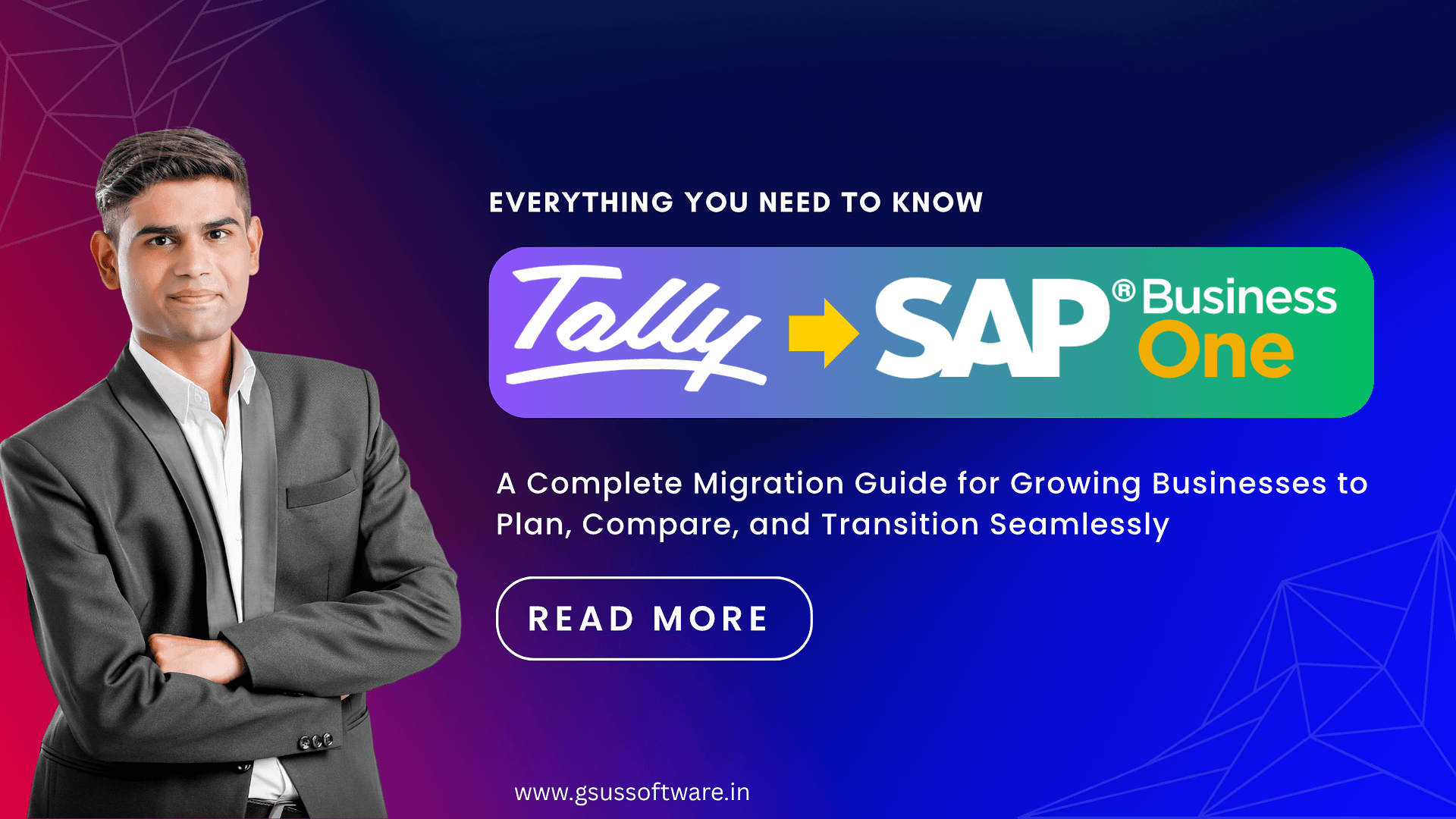Switching from Tally to SAP Business One is not just a software upgrade — it’s a strategic move that can reshape how your business operates, scales, and competes. But with great power comes greater planning.
Whether you’re a manufacturing firm drowning in spreadsheets, a growing retail chain with scattered operations, or a CFO looking for better reporting, this guide is your essential checkpoint.
Why Businesses Consider Migrating from Tally to SAP Business One
Tally has long served Indian SMEs for basic accounting and financial needs. But as businesses grow, their need for automation, integration, and insights increases.
Here’s what prompts companies to consider SAP Business One:
- Lack of real-time visibility in Tally beyond accounting
- No native modules for supply chain, CRM, or production
- Fragmented workflows due to multiple disconnected tools
- Limited data scalability for multi-location and growing teams
SAP Business One steps in with:
- All-in-one ERP covering finance, operations, CRM, SCM, and HR
- Real-time dashboards and drill-down analytics
- Multi-branch, multi-currency, and multi-user scalability
- Powerful customization and integration capabilities
Who Should Migrate?
SAP Business One is ideal for:
- Manufacturing and process industries
- Retail chains and distributors
- Chemical, pharma, or textile companies
- Startups with 20+ employees scaling rapidly
- Businesses ready to digitize entire operations, not just accounts
If you’ve outgrown Tally’s capabilities or want your departments to work from one system — SAP Business One is your next step.
Key Differences Between Tally and SAP Business One
Feature | Tally | SAP Business One |
Primary Use | Accounting only | Full ERP – finance, CRM, inventory, etc. |
Scalability | Limited | Highly scalable |
Integration | Low | Native and third-party integration ready |
Data Handling | Basic | Advanced with high-volume capability |
User Access Controls | Basic | Role-based, secure, audit-traceable |
Cost | Low upfront | Higher initial, but better long-term ROI |
Customization | Minimal | Highly customizable (UDFs, SDK, APIs) |
Stat to Consider: 64% of businesses that adopt integrated ERP systems like SAP Business One report faster decision-making due to real-time data access.
Steps to Prepare for Migration
Migrating isn’t plug-and-play. Here’s a streamlined plan:
1. Assess Your Business Needs
Map out what Tally lacks and where your business is headed — process-wise, scale-wise, and analytics-wise.
2. Evaluate Implementation Partners
Don’t go solo. Choose a certified SAP Business One partner with domain expertise (like GSUS Star Software) for smooth onboarding, customization, and support.
3. Understand the Migration Process
From data extraction in Tally to configuration in SAP B1 — the process typically involves:
- Requirement gathering
- Sandbox trial setup
- Data mapping and migration
- User testing
- Go-live and post-support
4. Plan for Data Migration
Create a plan for:
- Master data (customers, vendors, items)
- Opening balances
Transactional history (optional based on need) Data validation is critical.
5. Train Your Team
SAP is intuitive, but not basic. Train your core users in modules like Sales, Inventory, and Production Planning.
6. Prepare for Challenges
You may face:
- Resistance to change
- Downtime during migration
Reporting mismatches initially Planning with a seasoned partner avoids most roadblocks.
Why GSUS Star Software for Your SAP Business One Migration?
At GSUS Star Software, we don’t just implement SAP — we align it with your business DNA.
- Over 10 years of ERP expertise
- Specialized in manufacturing and supply chain verticals
- Proven track record with Tally-to-SAP B1 transitions
- Onsite and remote training with lifetime support
- Competitive pricing with modular implementation
FAQs About Migrating from Tally to SAP Business One
Is my Tally data fully transferable to SAP?
Yes, most master and transactional data can be migrated with proper mapping and validation.
How long does the migration take?
On average, 4 to 8 weeks, depending on complexity and customization.
Will SAP Business One replace all my existing tools?
It can — especially for inventory, CRM, purchase, sales, and finance. We’ll help you evaluate tool-by-tool.
Do I need an IT team to run SAP?
Not necessarily. With cloud-hosted SAP B1, you can run it without a dedicated IT team. Support is managed by us.
What if my team only knows Tally?
We provide dedicated training, video tutorials, and support to ensure easy adoption.
Get free migration checklist
Get a free migration audit from GSUS Star Software.
